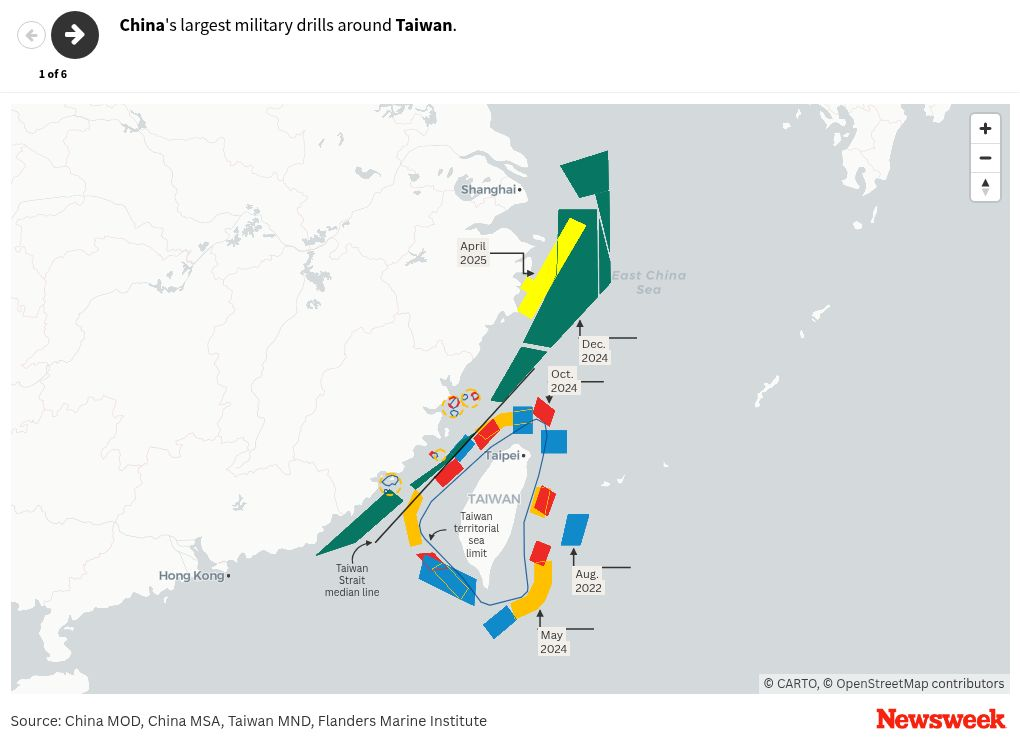Would Donald Trump Defend Taiwan?
China’s latest round of military drills around Taiwan has once again drawn attention to one of the most consequential unknowns in global security: if Beijing invades, would U.S. President Donald Trump try to stop it?
China’s Warning Shots and Taiwan’s Place
Last week, the Chinese military’s Eastern Theater Command conducted two days of exercises around Taiwan, describing them as a “severe warning.”
Beijing claims Taiwan as its territory, though the Chinese Communist Party has never governed there. President Xi Jinping has repeatedly said unification with the democratic island is inevitable and has not ruled out the use of force.
Taiwan sits along the so-called first island chain, a series of U.S.-aligned territories seen by military planners as key to containing Chinese naval expansion.
It’s also one of the most critical links in the global economy, producing more than 90 percent of the world’s most advanced semiconductors—used in everything from smartphones and electric vehicles to missile systems and artificial intelligence hardware.
Although Washington does not recognize Taiwan diplomatically, it remains the island’s top weapons supplier. During Trump’s first term, his administration approved several major arms packages, including upgraded F-16V fighter jets. But according to the Cato Institute think tank, Taiwan is still waiting on around $20 billion in backlogged U.S. weapons deliveries.
Liu Pengyu, spokesperson for the Chinese Embassy in the U.S., reiterated Beijing’s position that “Taiwan is an inalienable part of China’s territory.”
“The Taiwan question is China’s internal affair and is at the core of China’s core interest. Resolving the Taiwan question is a matter for the Chinese ourselves that no one can interfere in,” he told Newsweek.
Strategic Ambiguity
In late March, The Washington Post cited an internal memo, signed by Defense Secretary Pete Hegseth and distributed to Pentagon employees, appearing to double down on the U.S.’s pivot to the Indo-Pacific region.
The document also characterized a hypothetical invasion of Taiwan as a scenario that should be given higher priority than other potential emergencies, the Post said.
Raymond Kuo, a political scientist at the RAND Corporation, an international research and analysis organization, said Trump’s Taiwan policy may not ultimately be shaped by his national security team.
“Trump likes to keep the final decision to himself as far as I understand. And in this sort of situation, the decision would be on the president. It’s not something that gets delegated to even someone like the secretary of defense,” he told Newsweek.
Kuo added that while figures like Hegseth and others may talk up Asia-focused strategies, their actual influence over policy remains uncertain. “Are these guys actually running the foreign policy?” Kuo asked.
“Trump’s main initiatives have been tariffs, trying to take Greenland, and claim ownership of the Panama Canal. None of these things come out of what we think of as the China hawk people in the administration.”
Would Trump Act?
Pressed in February on whether he would defend Taiwan, Trump told Reuters he would not comment on the matter, saying, “I don’t want to ever put myself in that position.”
But the president has raised doubts in Taiwan after accusing the island of “stealing” America’s chip industry and suggesting it should pay the U.S. for its national defense support.
“I think President Trump does not want to get dragged into a war anywhere, and certainly not against China, but that does not mean that he would opt to not defend Taiwan if China attacks,” Bonnie Glaser, director of the Indo-Pacific program at the German Marshall Fund think tank, told Newsweek.
This is consistent with Washington’s decades-long policy of maintaining “strategic ambiguity” on whether it would come to Taiwan’s aid, she observed.
Despite the assurances from the officials, however, questions remain over how much of a priority the Asia-Pacific is for the administration.
“Even as Pete Hegseth said that the U.S. priority is the Indo Pacific, the U.S. military is focused on the Middle East, and there have been reports that the U.S. THAAD battery in Seoul along with two Patriot missile batteries, deployed elsewhere, were moved to the Middle East,” Glaser added.
Military Buildup and Uncertainty
Chuck DeVore, a retired U.S. Army lieutenant colonel and former California assemblyman, recently laid out three likely Chinese actions in The Federalist: a full-scale blockade to pressure Taiwan economically; a lightning strike to achieve a fait accompli before Washington can respond; or a wider regional attack involving U.S. bases in Guam, Japan, or the Philippines.
“On one hand, China is engaged in the largest military buildup in modern times, focusing on sea power, amphibious assault capabilities, long-range missiles, and nuclear weapons,” DeVore told Newsweek.
“On the other hand, President Donald J. Trump and his team are quickly repairing damage to our military—recruiting numbers have rebounded, morale is up, and there’s a steely-eyed focus on warfighting and deterrence.”

“The big question being, will China implode economically before it decides to take Taiwan?”
Despite economic headwinds, including a prolonged real estate slump and local government debt, China continues to channel resources into military modernization. “Despite a failing economy, there is a conscious decision to fund military capability,” former U.S. Indo-Pacific Command chief, Admiral John Aquilino, said last year.
Admiral Samuel Paparo, his successor, recently described China’s exercises around Taiwan as more than just saber-rattling. “They are rehearsals,” he said—dress rehearsals, in his words, for a future move against the island.
